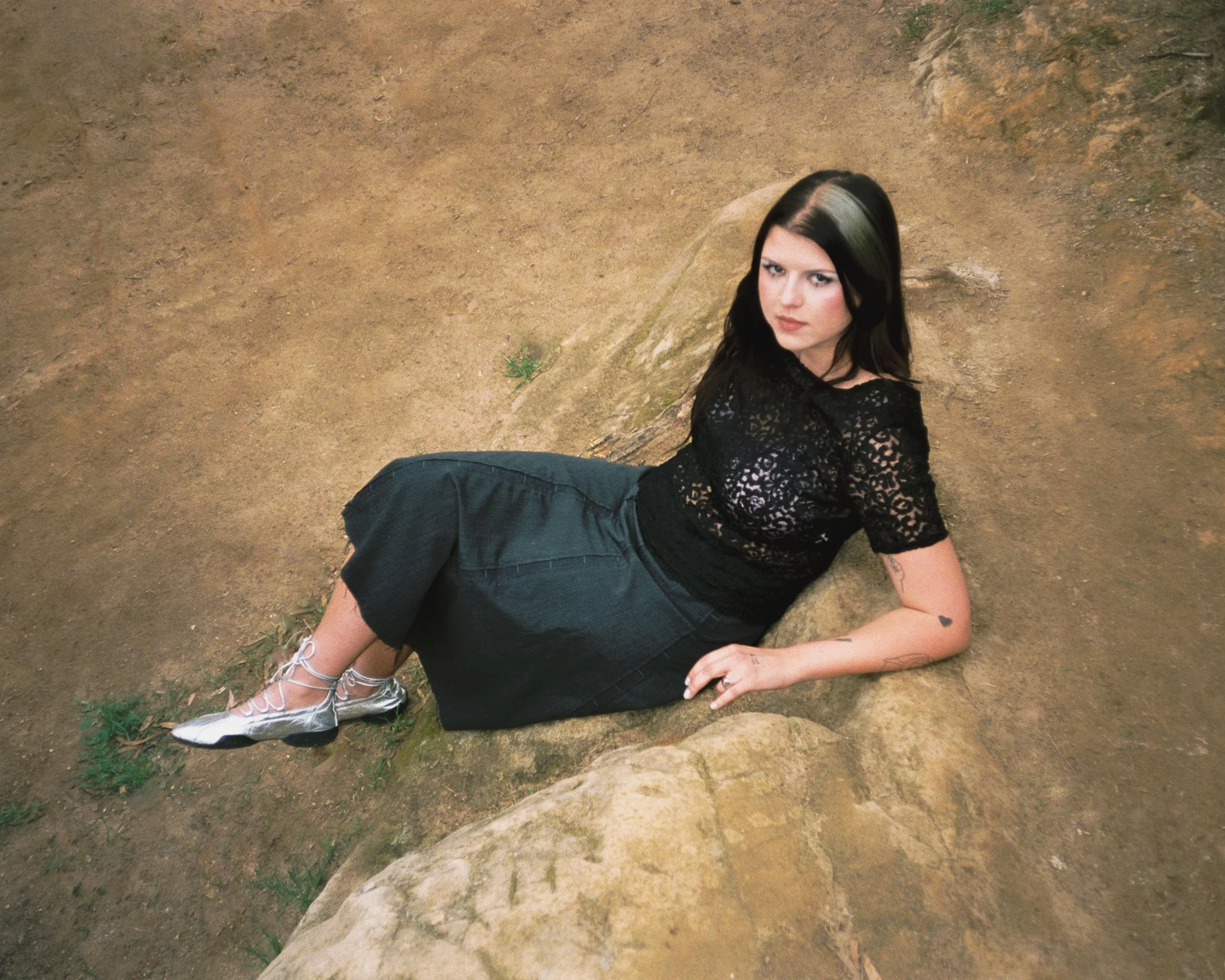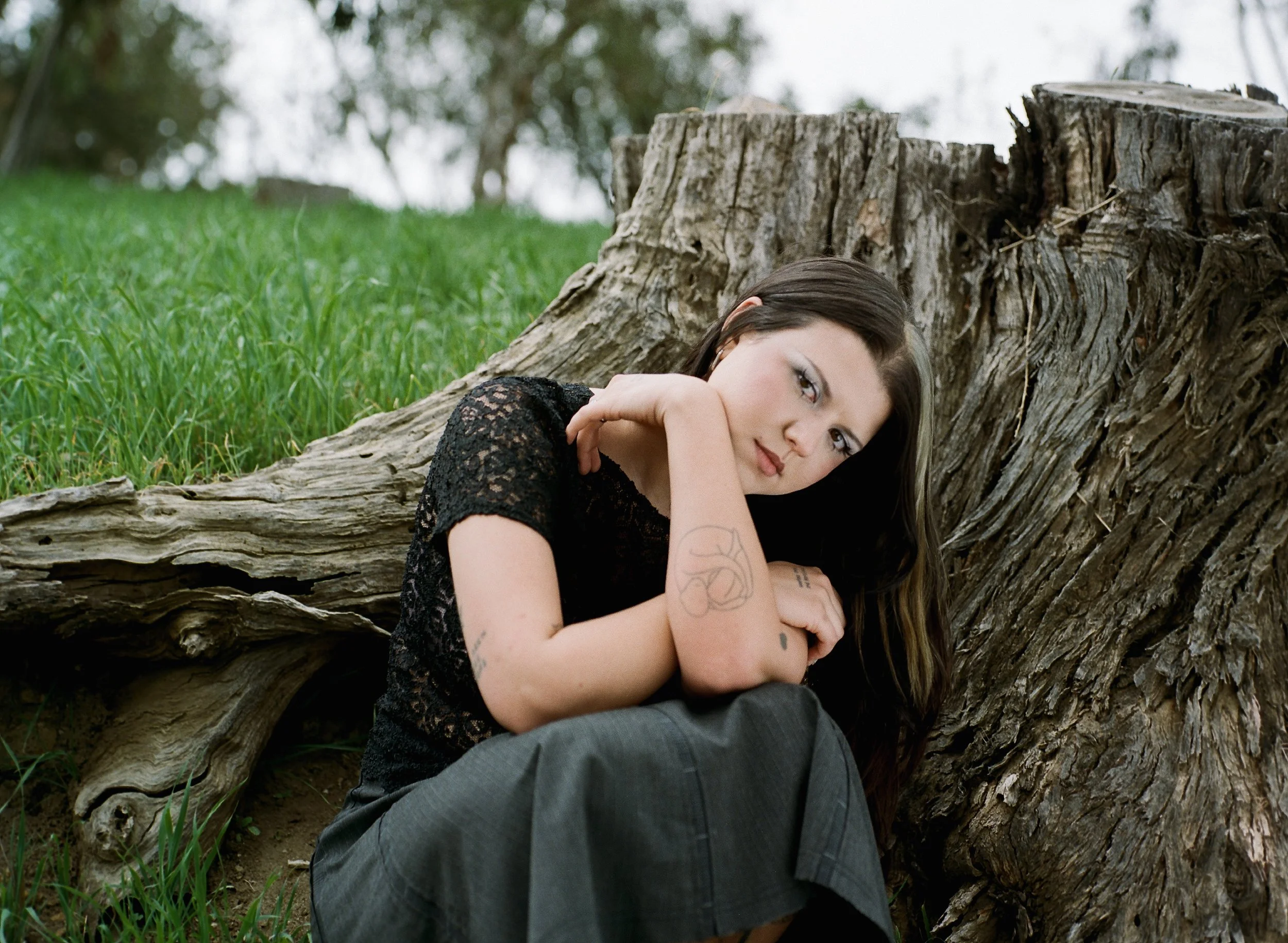Q&A: Eliza McLamb’s ‘Good Story’ is an Album About Letting Go of the Old Narrative
INTERVIEW
INTERVIEW
☆ BY SHEVON GREENE ☆
Photo by Spruce Bohen
ELIZA MCLAMB’S SOPHOMORE ALBUM GOOD STORY IS A MEDITATION—on what happens when the stories we tell about ourselves start to lose their truth. Written after the release of her debut Going Through It, the record focuses more on reflection this time around, turning the act of storytelling itself into the subject. Across its 13 tracks, McLamb dissects how we build meaning from pain, question the roles we’ve played, and learn to let old versions of ourselves fade.
The visual of the album cover includes a handmade silver trophy she built with her mom and represents a nod to imperfect achievement. There’s humor and self-awareness in songs like “Suffering” and “Like the Boys,” moments of quiet reckoning in “Mausoleum” and “Girls I Know,” and a thread of acceptance running through it all. The album, out today, is about outgrowing the need to explain, and finding peace in the uncertainty that follows.
We chatted with McLamb about the pull between art and self, the freedom of imperfection and why storytelling still matters. Read below for more.
Photo by Zoe Donahoe
LUNA: The title Good Story feels almost like a loaded phrase—-half confession, half commentary. When did you realize this record wasn’t just about your life, but about the act of turning your life into art?
MCLAMB: I started writing a bunch of songs that all circled the same idea, and then realized, oh, I’m writing a record about this. I’d been through a period where I was thinking about the decisions I was making in narrativizing my life and monetizing that narration. That’s how all these songs came about.
LUNA: Yeah, I love that. It must’ve been a relieving moment when everything started connecting.
MCLAMB: Definitely. It was that realization that I was working through something larger than I thought.
LUNA: I love the cover image: the hot-glued silver trophy you built with your mom. It feels like the perfect metaphor for imperfect achievement. How did that object come to represent the album’s tone?
MCLAMB: Visuals are always hard for me to put into words. I got the image in my mind first and came up with the story after. Good Story is a phrase with many meanings, but I was feeling like I used my narrative of an event as a consolation prize for something that felt out of my control. It was my way of finding agency, though eventually I realized that approach had diminishing returns.
LUNA: You said, “If you get really good at telling the story of who you are, you become the story you told.” When did that realization hit you?
MCLAMB: My first record was me trying to make sense of my chaotic adolescence. I came to know myself as this person who was damaged in certain ways, who had specific drawbacks and strengths. Then as I grew and changed, I questioned whether those things were still true. It scared me to think, what if that damage doesn’t define me anymore? What if it’s transformed? That forced me to find meaning in new ways and recognize that my pain and my identity were more flexible than I thought.
LUNA: Half of your first record Going Through It was about survival, but Good Story feels like a reevaluation. How did your approach to songwriting change once you stopped needing to explain yourself to the past?
MCLAMB: I started examining my impulse to create a story. Storytelling and art are still important to me, but I wanted to ask: What am I getting out of this and what am I not? The first record was about making sense of what happened to me and finding agency through it. As I got older, that relationship got more complicated. It wasn’t just about transforming pain anymore, it was about questioning why I needed to.
LUNA: You once said you wanted to stop feeling so solipsistic. Did writing Good Story help loosen that hold, or did it expose new layers of self-awareness?
MCLAMB: Writing has always been a private, individual process for me. My effort to feel more part of a collective happened in my real life, through my relationships and community. I realized that my narratives were keeping me stuck. Working through that, and learning to accept my own multifaceted nature, helped me show up differently in the world.
LUNA: “Better Song” opens the album and it feels almost like a thesis on creative anxiety and the urge to keep rewriting your own narrative. Was that intentional?
MCLAMB: Yeah, it’s also about a relationship that only worked one way. The story of it was so entrenched that it felt impossible to make something new. It was painful to realize that it had reached a dead end. The outro being purely instrumental felt right; it’s like letting go of the need to explain.
Photo by Zoe Donahoe
LUNA: In “Suffering,” you write, “I get off on suffering, it’s my favorite thing.” It’s biting and witty but also deeply honest. Do you ever feel conflicted about mining pain for art, or is the self-awareness part of the catharsis?
MCLAMB: Some people described my last record as me diving into the worst things that ever happened, assuming meaning came just from the pain. But for me, it was always about transformation—taking something horrible and creating something out of it, asserting agency. “Suffering” was liberating to write. I realized part of me was attached to being someone who’d suffered; it made me feel different or deeper. Admitting that was empowering. It let me take responsibility for my desires instead of seeing myself as someone things just happen to.
LUNA: “Like The Boys” captures that desire to be seen as strong, fearless, untouchable. Did you have to grieve that version of yourself to move on from it?
MCLAMB: Yeah, it’s about how difficult it is to be a teenage girl and think about power; who gets it and who doesn’t. There’s grief in realizing how much is out of your control. I wanted that unburdened feeling I saw boys have—reckless, free, forgiven easily. But I also realized they were performing power, too. We were all acting out these ideas of it. It’s about that longing and disillusionment.
LUNA: “Mausoleum” is one of the record’s darker metaphors and one of my favorites. You write, “I built a mausoleum where I keep only dead things near.” When you write something that raw, how do you decide when it’s safe to let it live publicly?
MCLAMB: Every song goes through so much editing and transformation that by the time it’s finished, it doesn’t feel “raw” to me anymore. “Mausoleum” is about grieving the stories that no longer serve me—being haunted by them, even when I know they’re dead. That image of a swamp witch haunting her own mausoleum really stuck with me.
LUNA: I also love “Girls I Know.” How did writing that song shape how you think about past versions of yourself?
MCLAMB: It’s about the women in my life who’ve been through so much. We shared chaotic, risky teenage years and then chose calmer adulthoods. That choice can be painful. Healing isn’t glamorous; it’s brushing your teeth, saying no to old habits, doing the tedious work every day. It’s rewarding, but it’s also grief for the chaos you left behind, and for the people who didn’t make it out.
LUNA: “Suffering” moves from delicate piano to full distortion, while “Water Inside the Fence” loops like a mantra. How much of that sonic escalation was instinctive versus deliberate?
MCLAMB: “Suffering” came together naturally; I realized later how dramatic I wanted that contrast to be. With “Water Inside the Fence,” I always knew the ending would spiral. It’s a song about dissociation and repression, so the big blowout felt necessary.
LUNA: If Good Story had a visual mood board beyond the trophy, what would it look like?
MCLAMB: I love the image of a lifeboat at the dock. There’s also the contrast between urban and natural, like grass growing through the sidewalk. Haunted, witchy graveyard energy, but also fast cars, movement, life (laughs).
LUNA: If Going Through It was your debut memoir, is Good Story a second chapter or something completely new?
MCLAMB: It’s in conversation with the first, but it feels self-contained. It’s basically a record about a concept I got obsessed with and started exploring from every angle.
LUNA: What’s one lyric from Good Story that might sting a little when you sing it live?
MCLAMB: Probably “self-serving poet, and it isn’t enough.” It feels almost too honest—part of me cringes at it, but it’s real. I stand by it (laughs).
LUNA: I love that. Even when it makes you wince, it’s still truth, and listeners will feel that.




